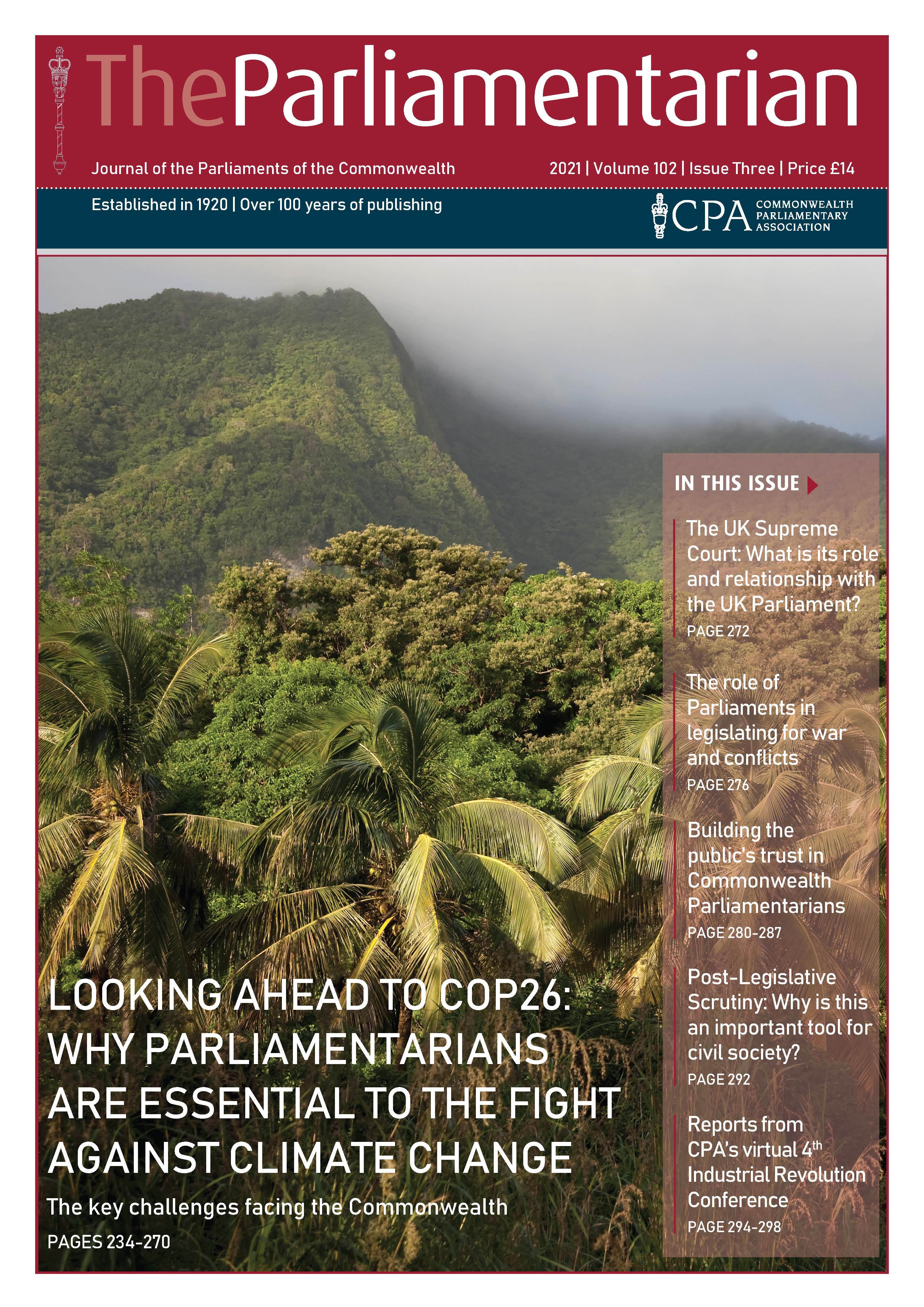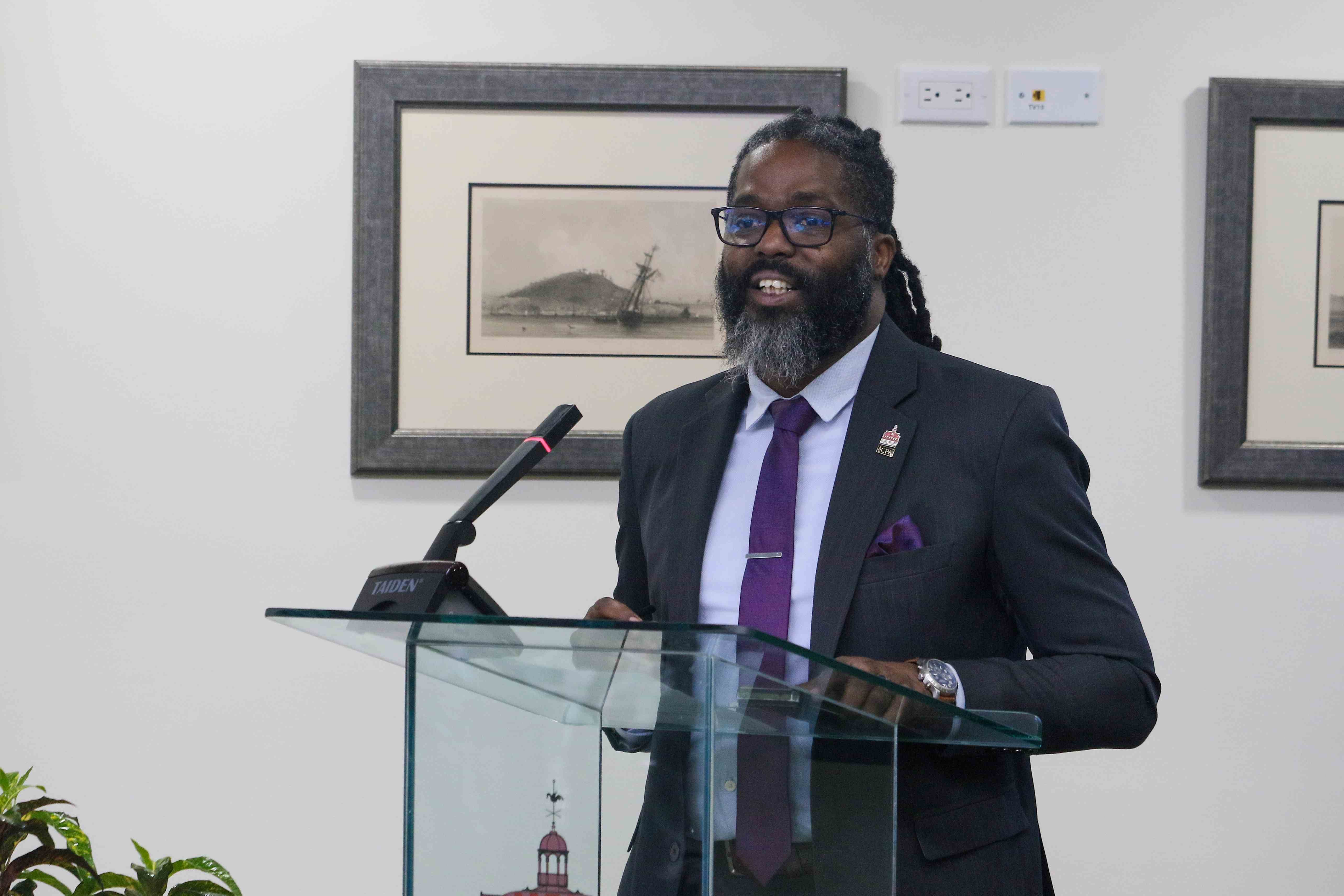The Parliamentarian is the quarterly Journal of Commonwealth Parliaments published by the Commonwealth Parliamentary Association (CPA) and features articles, news and legislative reports written by Members of Parliament, parliamentary staff and international experts across the Commonwealth about a wide range of global issues. Click here to download the latest issue.

From the pandemic to the Paris Agreement, Parliamentarians are mission critical to change
This blog is part of the CPA’s blog series, ‘Climate change challenges for the Commonwealth'. The series was published as the COP26 conference takes place in Glasgow in November 2021. You can find all the articles in the series here.
Ahead of COP26, the Chair of the Parliamentary Network on the World Bank and the IMF, Rt Hon. Liam Byrne MP (United Kingdom) writes about the critical role of Parliamentarians in global development.
We now live, not in an era of change, but in a change of era. Over the next ten and half thousand days, the brief arc of time between the pandemic and Paris agreement deadlines, we must change the way billions of people take trillions of decisions each and every day. It is the biggest political challenge the human community has ever confronted. Which is why Parliamentarians must be centre stage.
There is an old maxim once penned by the British philosopher Thomas Hobbes; ‘hell is the truth seen too late’. Today, we can see the truth of climate change; but acting on that truth will depend on politics, politics depends on votes and votes in the year ahead will go to those who offer a very different kind of ‘GIG economy’; an economy of Green Inclusive Growth. Success will require Parliamentarians helping to make the trade-offs to win five arguments with citizens.
First, Parliamentarians must explain a plausible plan to increase the pace of change. The IPCC reports are clear. We are running out of time. Things are worse than we thought. The pace of change must accelerate and the chorus line of powerful voices urging our constituents to demand ambitious targets is wide and strong. This is a good thing. But politicians have to translate those ambitions into practical programs of change, or hold governments to account for delivery.
But, here’s the challenge; although evidence is building, the design of practical programs is still in its infancy. Voters are not stupid. They know the difference between a soundbite and a strategy. Designing programs that actually make an impact is so complicated that Parliamentarians will need to radically improve the way we learn from each other, and draw on both World Bank and IMF thinking and experience to help avoid the time-consuming and expensive business of reinventing the wheel.
Second, Parliamentarians will need help squaring the bargain between winners and losers. The call for a ‘just transition’ championed by trade unions and civil society, underlines how, in any big public policy change, some will gain and some will lose. But the ‘losers’ have votes. But how do we measure who is gaining? How do we share those gains? How do we measure who is losing? How do we craft the compensation needed? And how do we make sure that compensation arrives in time, before the next household bills are due? Governments will fall unless just transition is a reality.
The debate about carbon taxes is a useful example. IMF leaders rightly explain that carbon pricing is now widely accepted as the most important policy tool to achieve the drastic cuts to emissions. By making polluting energy sources more expensive than clean sources, carbon pricing provides incentives to improve energy efficiency and to re-direct innovation efforts towards green technologies. Of course, carbon pricing needs to be supported by a broader package of measures to enhance its effectiveness and acceptability including public investment in clean technology networks (like grid upgrades to accommodate renewables) and measures to assist vulnerable households, workers, and regions. Nonetheless, at the global level, additional measures equivalent to a carbon price of US$75 per ton or more are required by 2030 .
The distributional impact of this on millions of low paid workers will be political suicide if mismanaged and implemented without simple, failsafe, real-time means of providing compensation to those at risk of experiencing seismic impacts on the cost of living.
Third, Parliamentarians will need to prove the potential for creating new jobs in the local green economy. New vacancies must be real, local and decently paid. This is especially important given the loss of a quarter of a billion jobs around the world in 2020, a shock the UN International Labour Organization (ILO) says is four times the number lost during the 2009 global financial crisis. Investments to cut carbon can create jobs, but the fiscal multipliers are very, very different for different interventions.
Most voters have no idea what a ‘green job’ is, and jobs created by these new measures will seem novel and risky. They will need to be seen to be believed. What is more, Parliamentarians will have to marry these ideas to a real vision of jobs in places where citizens actually need them. That is a mammoth challenge not least because success will critically depend on countries building retraining systems. Yet as the OECD’s Katherine Mullock argues in our recent book, Just Transitions, retraining budgets need to reach 1-4.5% of GDP and crucially, these programmes have to be delivered, as Network Board member Vjosa Osmani argues in ways that radically close the enormous gaps in gender equality.
Fourth, Parliamentarians will need to show new programmes can actually lower the cost of living in this new economy. Bluntly, governments need to offer measures to help households already struggling to afford basic necessities pay for higher energy costs. These measures should extend to coal miners and other workers and communities that depend on high carbon sectors for their livelihoods. On the international front, financial support will be necessary for developing economies, which are expected to incur greater costs in the transition yet have little means to pay for it.
Finally, Parliamentarians will need to work much more effectively with the private sector to help mobilise private sector finance and critically the world’s goldmine of private pension wealth, especially the over US$3 trillion committed to ESG funds . This is not simply a question of building new frameworks for investment managers. Ultimately pension savings are controlled by pension savers and today, the woeful inadequacies of financial reporting and the opacity of pension fund accounting severely limits the way pension savers could make good choices and invest in companies which are not poisoning their planet, shortchanging their workers or dodging their taxes.
These five challenges are incredibly tough. And this is only half the story. Because we need to make these choices while navigating a bow wave of ‘disease debt’ which the Parliamentary Network highlighted in our letter to G7 leaders, has grown by over US$220 billion last year. As developed nations begin to exit from monetary policy stimulus, more and more of this debt will become harder and harder for poorer countries to pay back. In March, US$290 million left the world’s emerging markets every day as bond yields began to rise in the world’s richest countries.
The World Bank Group committed to achieving 35% in climate finance for the entire WBG, as an average over the five years of 2021–2025, with at least 50% of IDA and IBRD climate finance to be allocated to adaptation with specific transformative public and private investments in five key systems: energy; agriculture, food, water, and land; cities; transport; and manufacturing. These systems are being prioritised because they contribute the most to emissions - together, they produce over 90% of global GHG emissions - and face significant adaptation challenges. All new operations will be aligned with Paris targets by 1 July 2023, and for the IFC and MIGA, 100% will be aligned by 1 July 2025.
There is an old African proverb that says if you want to go quickly, go alone. But if you want to go further go together. For the years ahead, Parliamentarians will be critical to both moving fast, and moving together. It is a daunting future.
This blog post is an extract from a longer article in The Parliamentarian (2021 Issue Three) - to read the full article please click here.
This blog is part of the CPA’s blog series, ‘Climate change challenges for the Commonwealth'. The series was published as the COP26 conference takes place in Glasgow in November 2021. You can find all the articles in the series here.




